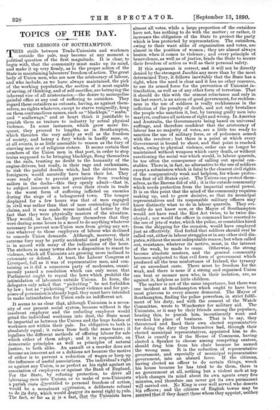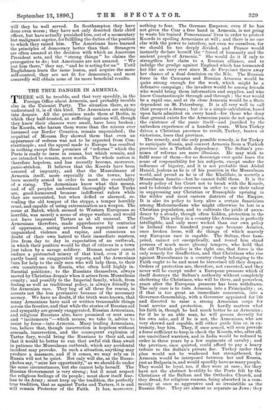TOPICS OF THE DAY.
•••-■0.-
THE LESSONS OF SOUTHAMPTON.
rnS strife between Trade-Unionists and workmen outside the pale, may become at any moment a political question of the first magnitude. It is clear, to begin with, that the community must make up its mind, and make it up very firmly, as to the proper action of the State in maintaining labourers' freedom of action. The great body of Union men, who are now the aristocracy of labour, and who include, as we have always maintained, the pick of the working population, the section of it most capable of saving, of thinking, and of self-sacrifice, are betraying the inherent vice of all aristocracies,—the desire to monopolise gainful office at any cost of suffering to outsiders. They regard these outsiders as outcasts, having, as against them- selves, no rights whatever, except to starve resignedly, heap on them contumelious names, such as " blacklegs,"." scabs," and " scallawags," and at heart think it justifiable to punish them as traitors to industry by actual physical violence. In some instances, which grow more fre- quent, they proceed to lengths, as in Southampton, which threaten the very safety as well as the freedom of society, and betray a fury which is hardly sane, or, at all events, is as little amenable to reason as the fury of starving men or of religious rioters. It seems certain that numbers of the Union men in that port, in order to stop trains supposed to be bringing blacklegs, flung themselves on the rails, trusting no doubt to the humanity of the engine-drivers, but ready, in their rage and enthusiasm, to risk the painful deaths which, had the drivers been foreigners, would assuredly have been their lot. They were ready also to prevent provisions from reaching sailors in the docks—this they openly admit—that is, to subject innocent men not even their rivals in trade to the worst form of suffering inflicted on enemies during the siege of a beleaguered town. The temper displayed for a few hours was that of men engaged in civil war rather than that of men contending for civil claims, and it was made worse instead of better by the fact that they were physically masters of the situation. They would, in fact, hardly deny themselves that they were during some hours in a mood to do anything whatever necessary to prevent non-Union men from giving any ser- vice whatever to those employers of labour who declined to concede Union demands. Although, moreover, their extreme fury may be partly accidental and partly local, it is in accord with many of the indications of the hour. The strikers in many towns show a disposition to resort to violence, which all Unionists are growing more inclined to extenuate or defend. At least, the Labour Congress at Liverpool, full as it was of representative men, and con- taining as it did a numerous party of moderates, unani- mously passed a resolution which can only mean that Parliament aught to repeal the laws which prohibit the intimidation of labourers outside Unions. In form, the delegates only asked that " picketting " be not forbidden by law ; but as " picketting " without violence and for pur- poses of persuasion is already legal, they must have intended to make intimidation for Union ends an indifferent act.
It seems to us clear that, although Unionism is a neces- sity of our present social system, because without it the insolvent employer and the unfeeling employer would grind the individual workman into dust, the State must be impartial as between the Unions and the huge bodies of workmen not within their pale. Its obligation to both is absolutely equal ; it raises from both the same taxes ; it legalises the different methods of offering labour for sale which either of them adopt ; and it is responsible, on democratic principles as well as principles of natural justice, to both alike. An assault or a murder does not become an innocent act or a dubious act because the motive of either is to prevent a reduction of wages or keep up the influence of useful associations. The individual's right as against any Union, is as perfect as his right against an association of employers or against the Bank of England. For the State, by refusing protection, to drive all , men into Unions, or to make of non-Unionists a. pariah gaols kii§entitled to personal freedom of action, would be a monstrong orrression, a deliberate refusal to do it§ ditty, which wool aefitzw its moral right to Pule. The fact, so far it is a fact, -NA the Unionists have almost all votes, while a large proportion of the outsiders have not, has nothing to do with the matter; or rather, it increases the obligation of the State to protect the party which is less protected by representation. The outsiders,. owing to their want alike of organisation and votes, are almost in the position of women ; they are almost always beaten when it comes to violence ; and every principle of benevolence, as well as of justice, binds the State to secure their freedom of action as well as their personal safety.
If this argument is correct, and it will not be directly denied by the strongest Jacobin any more than by the most determined Tory, it follows inevitably that the State has a right, when the need is clear and it has no other resource, to use its armed force for the prevention of Unionist in- timidation, as well as of any other form of terrorism. That it should do this with the utmost reluctance and only in the last resort, is an axiom of good government, for reckless- ness in the use of soldiers is really recklessness in the infliction of the penalty of death, and not only brutalises. the people who sanction it, but, by turning guilty men into martyrs, confuses all notions of right and wrong. In America and Australia, the Governments being based on universal suffrage, and therefore confident that the aristocracy of labour has no majority of votes, are a little too ready to sanction the use of military force, or of policemen armed with the revolver ; but there is a point at which every- Government is bound to shoot, and that point is reached when, owing to physical violence, order can no longer be without weapons which carry death, or without sanctioning the social war which would, in labour quarrels,. be too often the consequence of calling out special con- stables. There is, in fact, no alternative to the use of soldiers. except a submission which is fatal to the clearest civil rights. of the comparatively weak and helpless, for whose protec- tion first of all States exist. The Unions can protect them-. selves, as the Barons did of old ; it is the outside community- which needs protection from the impartial central power. It is on this point that the mind of the community requires. making up, and to grow decisive, so that its municipal representatives and its responsible military officers may know distinctly what to do in labour quarrels. They evi- dently do not know now, or the Mayor of Southampton would not have read the Riot Act twice, to be twice dis- obeyed ; nor would the officer in command have resorted to the use of jets of water, which the police, or constables hired from the shipping for the occasion, would have employe& just as effectively. God forbid that soldiers should ever be called out, either in labour struggles or in any other civil dis- putes ,without the most indisputable reason; but when called out, resistance, whatever its motive, must, in the interest of the weak, be made to cease. Otherwise, the strong. become absolute masters, and the general community becomes subjected to that evil form of government which produced all the true misfortunes Of Ireland, the tyranny of an ascendant caste. There must be freedom for the weak, and there is none if a strong and organised Union can beat or menace men who, in their isolation, are, as against it, helpless as little children.
The matter is not of the same importance, but there was one incident at Southampton which ought to have been most grievous to every sincere democrat. The Mayor of Southampton, finding the police powerless, in strict fulfil- ment of his duty, and with the consent of the Watch Committee, wrote to Winchester for military aid. The Unionists, or it may be their friends among the populace, hearing this, to punish him, incontinently went and wrecked his place of business. That is to say, they threatened and fined their own elected representative for doing the duty they themselves had, through their elected municipal representatives, appointed him to do. That is exactly as if the House of Commons, having elected a Speaker to choose among competing orators,. should drag him from his chair because he named the wrong man. It is the reduction of representative government, and especially of municipal representative government, into an absurd farce. If the citizens, having elected. an officer to do certain things, wreck his house because he has tried to do them, there is no government at all, nothing but a violent mob at top which changes its mind about its own agents every five minutes, and therefore can never get its own permanent wig carried out, No King is ever well served who deserts his officers ; and the citizens of English towns may be to that if they (Wert those whom they appoint, neither will they be well served. In Southampton they have done even worse ; they have not only deserted their chief officer, but have actually punished him, out of a momentary but malignant caprice, for fulfilling the duties of the position to which they raised him. • The Americans have learned. the principles of democracy better than that. Strangers are often amazed at the decision with which an American President acts, and the " strong things " he claims the prerogative to do ; but Americans are not amazed. " We put him there," they say, " and he is acting for us." Until Englishmen learn the same lesson, and acquire the same self-control, they are not fit for democracy, and most assuredly will obtain none of its more beneficial results.







































 Previous page
Previous page